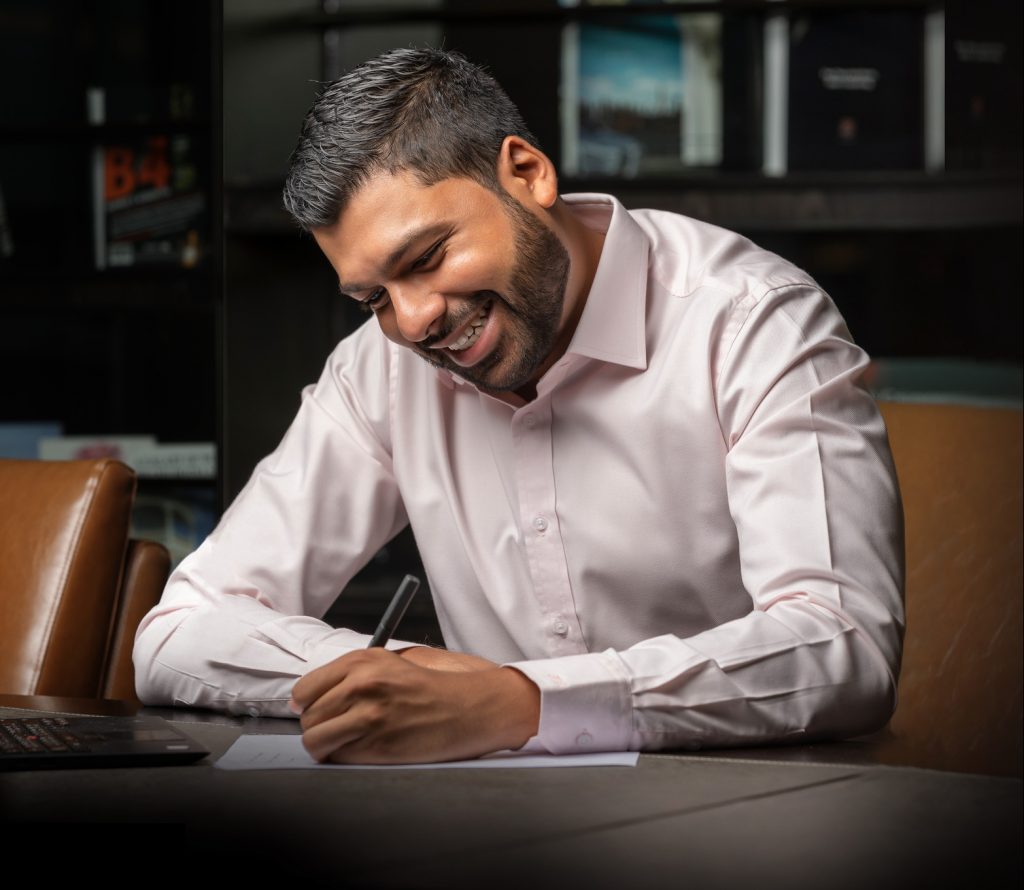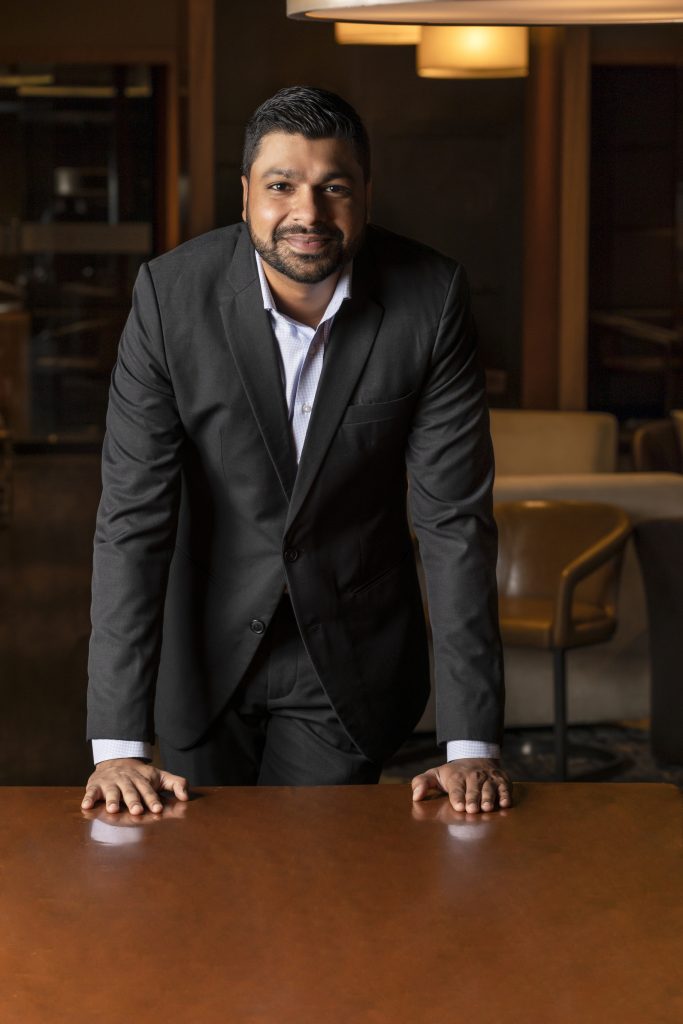How he’s taking on the world of management consulting with curiosity, adaptability, and grit.
By Aiden Jewelle Gonzales
Photos taken at Bangkok Marriott Marquis Queen’s Park
In recent years, management consulting has hit the public radar in a big way, despite the illusory nature of the job to us laymen. It’s often a hallmark of success in our peers; an indication that they were willing to put in the hours, and possess a keen and analytical mind to be envied. But what does it mean to be a management consultant, and what does it take? Masala spoke to 31-year-old Kush Sodhia who, despite his relative youth, is thriving at Boston Consulting Group (BCG), considered one of the ‘Big Three’ firms of the management consulting world.
Born and raised in Bangkok, Kush’s international background began with his schooling in Bangkok Patana School (BPS) before moving to Boston to study Finance and Accounting at Boston University. Soon after, he took the natural route and embarked on a career in finance, moving to London in the UK to work at banking giant J.P. Morgan. However, he soon decided on a more challenging direction, completing his MBA at the University of Chicago Booth School of Business, one of the world’s leading business schools, which he credits as one of the accomplishments he’s most proud of. “I applied knowing that acceptance rates weren’t high,” he recalls, but maintains that taking the chance was worth it. “With their impressive roster of alumni and professors, I feel very fortunate to have had the chance to be a part of that community. ” Thereafter, he pursued the cut-throat but rewarding sphere of management consulting, making friends and influencing people wherever he goes.
What led you to make the change to management consulting after your background in finance?
For me the appeal was getting the chance to work on a wide variety of projects, both from an industry and country perspective. Since our projects tend to run for three to six months at a time and are across Southeast Asia, we’re always being challenged with something new and different, which is what I wanted after four years in banking, where the day-to-day got a bit stale. I also wanted the opportunity to work more closely with clients.
How did your financial background help you on your professional journey to where you are now?
Working for J.P. Morgan in London was my first job out of college, and a very demanding one at that. I had done a few internships before but nothing that prepared me for the pace and intensity required in that job. Above all else, that experience helped me build a strong work ethic that was necessary for everything that came after that, during my MBA and now with BCG. Working in banking also helped me identify what to look for when I decided it was time to switch careers. I saw the parts of the job I did and didn’t like, and tried to find a career with more of what I enjoyed, namely, varied work and lots of client interaction.
What attracted you to BCG in particular?
It came down to the people that work there, and the scope of what BCG does across SEA. Consulting is a highly interpersonal profession where we spend a lot of time with our project teams, so it’s important to enjoy the company of the people you work with. Secondly, I knew I had to take the opportunity to work on interesting projects across SEA – in Jakarta, Singapore, Malaysia, and here – with some of BCG’s biggest clients on their most complex problems.
BCG has been noteworthy for having a more progressive approach to paid family leave, women’s rights, and LGBTQ+ rights. Do you believe this has made a big impact in your work culture, and in your opinion, has it contributed towards BCG’s success on the global scale?
Absolutely. I feel very proud to work for a company that is among the corporate leaders when it comes to diversity and inclusion because it is extremely important. It feels good to work somewhere that values and embraces people’s differences. That diversity of thought and experience also enhances the work that we do for our clients because we are getting a wide array of perspectives within each of our teams.
You’ve received many accolades and awards over the years. Can you tell us about them, and what you attribute your success to?
I’ve been very fortunate that my parents always stressed the importance of education as a good foundation. I’ve seen certain doors open because of the universities I attended or the people I met there. As with most things in life, I cannot deny that there is a fair amount of luck as well. While studying and working hard can get you 80 to 90 percent of the way, that last bit can come down to luck and hoping the right person reads your application or interviews you. I’m very conscious of the role luck has played both positively and negatively in my life, and I think it has helped me from ever getting too proud or discouraged, and keeps me focused on the path forward.
BCG is considered a global powerhouse in its sphere. How has your international background uniquely impacted how you operate in the company?
One thing that I really like about BCG is that people at the company have a wide variety of backgrounds and experiences and each of those, international or not, is extremely relevant to the work that we do. I do think my experience of growing up here, spending summers and winters in India, and then living and working in America and England influences what I bring to the table. There will be things that I have seen work in other countries that may work for companies in Southeast Asia.
In your opinion, what is the most important part of being a management consultant, and what do you enjoy most about your career?
There are two attributes that I think most successful management consultants have – they are comfortable with uncertainty and they are very curious. This job is an ever-changing one and as you are moving between projects and teams and clients, there is always uncertainty and part of the job is learning how to be comfortable while navigating that. You’re also solving complex problems that rarely have perfect solutions. There are quite a few roadblocks as you get to these solutions, so curiosity is important for you to see each roadblock as another data point rather than an obstruction. What I enjoy most about this job is the variety. During my time at BCG, I’ve had the chance to work across multiple industries with people from all over the world. I’m challenged daily by something new, and that really appeals to me, especially compared to jobs I’ve had previously.
Tell us about how you’ve overcome your biggest challenge to date.
A few years ago, I had to move back to Bangkok because I didn’t get lucky with the work visa lottery in the U.S., and it was tough. I’m a planner by nature and this was definitely not part of the plan so the challenge was figuring out a new path for myself and being satisfied with it. At the beginning, I focused a lot on the negatives but I soon realised that it might be the best thing that could have happened. For 12 years I lived away from my family and childhood friends, only seeing them once or twice a year. It was only once I moved back that I realised how much I was missing. I now get to watch my niece and nephew grow up, spend more quality time with my parents, sister and brother-in-law and be part of all the big things happening in my friends’ lives. The mindset shift was much needed.
With such a demanding career, what other interests do you try to balance?
I am an avid golfer and try to get out for a round with friends at least once a week, occasionally twice if time permits. I am also fortunate to have friends very well-versed on the restaurant scene here in Bangkok, so I’m constantly trying new places they recommend. Before this year, travel was also a big part of my life as I’d spend two to three weekends a month travelling to various places in the region, which I’ll hopefully get back to soon.
What does the future hold for Kush Sodhia?
Travelling, hopefully [laughs]! Ultimately, it comes down to doing something that challenges me every day and helps me grow as a person. It’s hard to tell what exactly that might be five, 10, 15 years from now, but I have that today and don’t see that changing in the foreseeable future.








